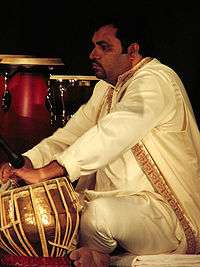Music of Kuwait

Prior to 1990 and the start of the Gulf War, Kuwait was known in the region for its exploration of many different and new forms of music and dance. However, after encounters with Iraqi soldiers in August 1990, Kuwait fell and its music was destroyed along with its oil fields. After just seven months under Iraqi conquest, Kuwait’s thousands of years of rich and diverse music was nearly completely destroyed.[1]
Traditional Kuwaiti music is derived from Kuwait's seafaring heritage.[2][3] The Kuwaiti maritime tradition is known for songs called "Fidjeri".[4][5] "Al Arda Al Bahariya" is a well-known Kuwaiti sailor song, as are the "al-Nahma", a class of songs that accompanied many sailing activities. Kuwaiti music reflects the diverse influence of many cultures,[6] including India and East Africa.
Kuwait was the pioneer of contemporary music in the Gulf.[7][8][9] Kuwaitis were the first commercial recording artists in the Gulf.[10][11][12] Nawal El Kuwaiti, Nabeel Shoail, Abdul Kareem Abdul-Qader and Abdallah Al Rowaished are the most prominent modern performers.[1]
Traditional
Traditional Kuwaiti music is derived from the country's seafaring heritage. In pre-oil times, Kuwait was regionally known for its music.[13] 20-30% of Kuwaitis were professional musicians.[14] Traditional Kuwaiti music reflects the diverse influence of many different cultures.[15] Saleh and Daoud Al-Kuwaity were prominent Kuwaiti musicians who wrote over 650 songs, many of which are considered traditional and still played daily on radio stations both in Kuwait and the rest of the Arab world.[16][17][18]
Kuwait's seafaring tradition is known for songs such as "Fidjeri".[19] "Fidjeri" is a musical repertoire performed traditionally by male pearl divers. It involves singing, clapping, drums and dances with earthen water jars. "Liwa" and "Fann at-Tanbura" are types of music performed mainly by Kuwaitis of East African origin. "Al Arda Al Bahariya" is a well-known Kuwaiti sailor song, as are the "al-Nahma", a class of songs that accompanied many sailing activities.
Contemporary
Kuwait was the pioneer of contemporary music in the Gulf.[20][21][22] Kuwaitis were the first commercial recording artists in the Gulf.[23][24][25] Kuwait is known as the center for "sawt", a bluesy style of music made popular in the 1970s. Kuwaiti music is popular throughout the Arab world. Nawal El Kuwaiti, Nabeel Shoail and Abdallah Al Rowaished are the most prominent modern performers.[1]
Kuwait has a reputation for being the central music influence of the GCC countries. Over the last decade of satellite television stations, many Kuwaiti musicians have become household names in other Arab countries. Bashar Al Shatty is a young artist who became famous due to Star Academy.
See also
References
- 1 2 3 Badley, Bill. "Sounds of the Arabian Peninsula". 2000. In Broughton, Simon and Ellingham, Mark with McConnachie, James and Duane, Orla (Ed.), World Music, Vol. 1: Africa, Europe and the Middle East, pp 351-354. Rough Guides Ltd, Penguin Books. ISBN 1-85828-636-0
- ↑ "Kuwait's musical heritage: The heartbeat of a nation".
- ↑ "Hidden Treasures: Reflections on Traditional Music in Kuwait".
- ↑ "Ya Bahr".
- ↑ "The Innerworkings of Kuwaiti Pearl Diving: Ghazi AlMulaifi".
- ↑ "Ya Bahr".
- ↑ "The History of Recording in the Gulf Area".
- ↑ "Performing the Past: Sea Music in the Arab Gulf States".
- ↑ "The History of Recording in the Gulf Area (2)".
- ↑ "Performing the Past: Sea Music in the Arab Gulf States". p. 99.
- ↑ "The History of Recording in the Gulf Area".
- ↑ "The History of Recording in the Gulf Area (2)".
- ↑ "Hidden Treasures: Reflections on Traditional Music in Kuwait".
- ↑ "Kuwait's musical heritage: The heartbeat of a nation".
- ↑ "Ya Bahr".
- ↑ "Jerusalem Diary: 2 March". BBC. 2009-03-02. Retrieved 2016-02-27.
- ↑ "Dudu Tassa Makes the Old Iraqi Music of Daoud Al Kuwaiti New in Israel". Tablet Magazine. Retrieved 2016-02-27.
- ↑ Urkevich, Lisa (December 12, 2013). "Crossing Paths in the Middle East: Cultural Struggles of Jewish-Kuwaiti Musicians in the 20th Century". American Historical Association. Retrieved February 27, 2016.
- ↑ "The Innerworkings of Kuwaiti Pearl Diving: Ghazi AlMulaifi".
- ↑ "The History of Recording in the Gulf Area".
- ↑ "Performing the Past: Sea Music in the Arab Gulf States".
- ↑ "The History of Recording in the Gulf Area (2)".
- ↑ "Performing the Past: Sea Music in the Arab Gulf States". p. 99.
- ↑ "The History of Recording in the Gulf Area".
- ↑ "The History of Recording in the Gulf Area (2)".